On August 6th, we co-hosted a walking tour of Bellingham in remembrance of our shared history in conjunction with Community to Community Development, Nikkei Northwest, Whiteswan Environmental (WE), and Northwest Youth Services. Together we visited five important sites in downtown Bellingham that hold memories of violence and oppression: the Okubo House, the Pickett House, the Salmon Woman Totem Pole in Maritime Heritage Park, the Dupont Street Bridge over Whatcom Creek, and the Whatcom County Courthouse.
On our walk, we visited the former home of James Okubo, a posthumous Medal of Honor recipient who attended Western until he and his entire family were removed and sent to camps in 1942. Bellingham’s anti-Asian history persists in a city where racial slurs like “Oriental Avenue” remain on a street sign near Lake Whatcom. The event also occurred on Hiroshima Remembrance Day, recognizing the ongoing impacts of nuclear war on survivors and the continuing threat of nuclear violence as our state houses both the Hanford Nuclear Plant where the plutonium used for the atomic bomb dropped on Nagasaki was enriched as well as the Trident Nuclear Submarine Base where one of the world’s largest concentration of nuclear weapons sits today. In reckoning with Bellingham’s history of colonization, white supremacy and oppression we also visited the house named after Confederate General George Pickett and discussed his continued recognition in Bellingham including a local bridge that once bore his name. We spoke about those who should be honored: the Indigenous people who the land chose, who have stayed with it and cared for it, and were violently displaced from traditional village sites throughout the United States and Canada and relocated to federally reserved lands. We also visited Whatcom Creek where the 1855 Point Elliott treaty signer for Lummi Nation, Chowitsut, welcomed the first settlers Roeder and Peabody to fresh water and food. The creek which our county is named after means “Noisy Waters” in the Lummi language. Now, many houseless people find respite from police sweeps and violence in this place. We ended our tour in front of Lummi carver Joe Hillaire’s Centennial Pole and the Whatcom County jail and courthouse, where many continue to be denied their basic right to freedom and dignity. We recognized the anniversary of the passing of farmworker Honesto Silva Ibarra, who died due to heat stress and wildfire smoke in Whatcom County in 2017. We spoke about the basic human right to water, how a glass of water was denied to Honesto, as well as the ongoing harm and displacement caused to BIPOC, immigrants and houseless people due to climate change, pesticide use, militarism, colonialism, incarceration, and exploitation. Through the event we were reminded of how Bellingham's community maps the ongoing impacts of white supremacy and colonization and the current displacements due to climate change and the housing crisis. Our organizations came together to mark these histories of oppression in service of co-constructing a future where those who have been pushed out and pushed down can experience liberation, safety, and community. The Whatcom Human Rights Task Force presents
the 24th Annual Rev. Dr. Martin Luther King, Jr. Human Rights Conference Thursday, January 13th – Saturday, January 15th, 2022 Online Event For the 24th consecutive year, the Rev. Dr. Martin Luther King, Jr. Human Rights Conference will create spaces for the community to share our stories and renew our commitment to the ideals that Dr. King held dear and believed deeply that this country could attain only by working together and acknowledging our shared history: ideals of equity, freedom, and self-determination. The title of the 2022 conference is “An Inescapable Network of Mutuality: Creative Extremism for the Cause of Justice.” This theme is taken from the letter (1) Dr. King wrote while he was incarcerated at the Birmingham City Jail in the Spring of 1963. You may find the reference to extremism disturbing, as Dr. King did initially when his fellow clergy members applied that label to the nonviolent direct actions King and the Southern Christian Leadership Conference had taken in Birmingham at the request of the local branch of Alabama Christian Movement for Human Rights. Upon reflection, Dr. King wrote that he “gradually gained a measure of satisfaction from the label.” He went on to ask, “So the question is not whether we will be extremists, but what kind of extremists we will be. Will we be extremists for hate or for love? Will we be extremists for the preservation of injustice or for the extension of justice?” In his letter, Dr. King was speaking directly to those he called “the White Moderate” admonishing them, and all of us, to shake loose of complacency and join “our brothers and sisters who have recognized the urgency of the moment and sensed the need for powerful action.” Dr King’s call to nonviolent action for the cause of justice remains as relevant today as it did in 1963 – if not more so. Building on the success of the 2021 Conference, the 2022 Conference will take place online over several days, January 13th - 15th. It will feature a range of presentation formats including performance art, films, and caucuses, in addition to standard workshop fare. As always, the Conference will be free and open to all. Clock hours will be available for teachers and continuing education units will be available for mental health professionals. (1) Martin Luther King Jr.'s 'Letter From Birmingham Jail' Website:https://whrtf.org/revdrking/2022-conference/ Facebook | Instagram: @revdrkingconference Poster link: https://drive.google.com/file/d/1TNmHWZHxrlvxGmxDZLaCGErc3epb4Sqy/view?usp=sharing Questions? Email: [email protected] BELLINGHAM — Last week, Bellingham Voters approved a ban on the use of facial recognition and predictive policing technologies by our City by a 14% margin, and overwhelmingly approved a ban on the use of city funds by employers for anti-union purposes with 63% of the vote. Initiative 2 and 3 were two resounding victories out of the four progressive initiatives brought to the ballot by People First Bellingham this election cycle.
Volunteer organizers collected over 9,000 signatures for each of the four proposed laws (over 36,000 total), overcoming the odds of signature-gathering during a global pandemic and meeting the unusually high threshold of signatures then required by Bellingham in order to place people’s legislation on the ballot. Initiative 2 will prohibit the city from acquiring or using facial recognition technology, or contracting with a third party to use facial recognition and predictive policing technologies on its behalf. It will also prohibit the retention of that unlawfully acquired data, and the unlawful use of that data in court as evidence. Maya Morales, People First Bellingham organizer, responded to the win: “Black, Indigenous, People of Color, Queer and LGBT, and Immigrant members of our community; local activists, organizers, and journalists will all be better protected with a ban on these invasive technologies. Clearview and other corporations have continued to amass huge troves of our personal data and to build ever-scarier and creepier tools. It’s heartening to see that Bellingham voters understand this, and have voted to reign in the civil rights violating practices that are inherent to this kind of tech being employed against us in our daily lives.” Bellingham is now one of a growing list of jurisdictions which have enacted facial recognition bans. The bipartisan King County Council unanimously approved a ban in June, and the European Union recently voted to ban all forms of predictive policing and facial recognition technology. Jennifer Lee, Technology and Liberty Project Manager for the ACLU of Washington, which endorsed Initiative 2, had this to say: “The success of Initiative 2 is a huge win for the people of Bellingham. They join twenty-two other jurisdictions in enacting bans on invasive policing technologies. Facial recognition and predictive policing tools are biased, inaccurate, and lead to life-or-death encounters with law enforcement. They also chill our democratic rights. Now, it's time for a federal ban on government use of facial recognition and predictive policing tools to protect everyone's civil rights and civil liberties.” With the passage of Initiative 3 by a whopping 63% of the vote, Bellingham voters have approved a ban on the use of city funds for anti-union and worker organizing purposes. Employers who receive city funds and decide to pursue anti-union activities will now be required to account for and segregate those funds. Betsy Pernotto, of Jobs With Justice, says “Bellingham voters overwhelmingly decided that workers won't have their tax money used against them to fight union organizing. This is a big win for workers--it shows that our community believes workers can decide for themselves if they want a union.” We are seeing significant numbers of workers organizing and mobilizing for better working conditions and better jobs all over the country. The global coronavirus pandemic has highlighted the stark disparity between the huge profits large corporations are making, versus the pay, benefits, and working conditions of their workers. Most workers on the frontlines of this emergency have been expected to sacrifice and suffer. This victory is a clear signal to local workers: there is significant support in Bellingham for organized labor, and that support likely transcends political party lines. Bellingham City Council adopted a formal resolution urging voters to vote “no” on all four initiatives the day before ballots were mailed. That came as a big shock to many voters in the community, and had an outsized influence not only on voter turnout among particular demographics, but also the higher number of votes opposing initiatives 1 and 4, in particular. In spite of City council’s opposition, and the fact that the majority of the voter turnout in this election was made up of voters ages 55 and up, Initiative 1 lost by a mere 1.3% – or 392 votes out of 28,898 total votes. Initiative 1 would have increased notice required for rent raises over 5% as well as for no cause evictions to 90 days, and would have required certain landlords to provide rental relocation assistance for renters when raising their rent by 8% or more. In order to move forward as a community that protects renters, who make up roughly 54% of Bellingham's residents, Tara Villalba of the Bellingham Tenants Union asserts, “We will make sure that our City Council doesn't sidestep the issue that this popular initiative was meant to address. Tenants are being displaced because of unchecked rent raises, even as we're still in a pandemic. Tenants must be part of making the solution to this rent gouging problem. City Council must protect not just the landlords in our community, but the tenants who actually pay the rent that pays for their landlord's mortgages.” “It’s time to join Portland and Seattle in passing strong renter relocation assistance protections and more notice for rent increases -- and we can’t accept a watered down version from council that exempts half of the landlords in Bellingham. In fact, it’s time to pass an expansive tenant’s bill of rights to keep our community housed. As workers, we make Bellingham what it is and it’s past time to legislate the protections to keep us from being priced out of our city.” Sage Jones, People First Bellingham organizer from Whatcom DSA, added. For the past 19 months, we have relied upon low-wage workers on the front-lines of this pandemic to provide services and goods, while working in potentially deadly conditions. Let's remember that the majority of people under the age of 55 have only had access to vaccines for the past seven (or less) of those nineteen months. Initiative 4 re-centered the conversation on worker’s rights and the need for fair employment conditions in Bellingham. Even though Initiative 4 didn’t pass, we still need to secure expanded rights and protections for workers before we are hit with the next emergency that puts workers at risk. People First Bellingham has every intention of winning this fight. Initiative 4 would have required the implementation of fair scheduling practices – giving workers greater power in accessing secure and predictable scheduling – and hazard pay for on-site workers during declared states of emergency that impact Bellingham directly. While the hazard pay section was clearly intended to apply to on-site workers not able to work remotely, false information and mischaracterizations of the initiative were spread by opponents, which included not just City Council, but The Chamber of Commerce; smaller businesses not included in the “under 30 employees” exception to number 4’s hazard pay section; and unknown entities hiding behind nearly $200,000 of corporate PAC monies from outside of Bellingham. Voters received multiple mailers, an expensive push-poll, and social media ads from the opponents of Initiative 4. Meanwhile, People First Bellingham sent out one mailer, and in spite of following the application steps meticulously, was not approved to use Facebook and Instagram Ads for our campaign, without any explanation from Facebook. Sam Wambold, People First Bellingham organizer, reflects on Initiative 4: "This campaign has only reaffirmed our conviction that Bellingham must do more to protect workers. We heard from so many workers about poor working conditions, unexpected schedule changes, abrupt loss of compensation, and a lack of increased pay to compensate for working in dangerous conditions. We're going to keep fighting for workers. We want to make Bellingham livable for all!” Bellingham’s economy is built on low-wage workers, yet housing and cost of living have continued to skyrocket. Workers need Bellingham City Council, and the broader business community, to participate in these conversations. We need them to work with us to create a Bellingham where all of our workers are cared for, and everyone has all that they need to thrive, not just survive. By a ten percent margin, voters also approved a proposition halving the signature requirement for future people’s initiatives, to align Bellingham with the norm in other WA cities, including Seattle and Tacoma. People First Bellingham offers thanks to all of the endorsers who have supported the vision and/or the work of this historic campaign to create a people’s Bellingham. Initiative 1-4 Endorsements: Whatcom County Jobs With Justice, Imagine No Kages (INK), Whatcom DSA, Whatcom Peace and Justice Center, Whatcom Human Rights Task Force, Sunrise Bellingham, Bellingham Unity Committee, Riveters Collective, Bellingham Tenants Union, Whatcom Democrats, Democratic Socialists of America, Washington Poor People's Campaign – A National Call for Moral Revival, Our Revolution WA, Initiative 1 Endorsement: Lummi Indian Business Council Initiative 2 Endorsement: ACLU of Washington People First Bellingham is an all-volunteer coalition made up of individuals and representatives from a group of local organizations who are working together to create material changes that put people over profit. With just a week until the election, The Whatcom Peace & Justice Center would like to reaffirm our support for Ballot Initiatives 1-4 and encourage you to do the same.
As we shared earlier in this campaign, "since 2002, The Whatcom Peace & Justice Center has functioned as a beacon for critical thinking, peace education and transnational solidarity. Our office works as a community hub, free library and resource center for activists and educators of all ages and backgrounds in Whatcom County. We believe that building community, people power and nonviolent consciousness are the best strategies to achieve lasting peace at home and abroad." From the moment we joined this campaign, we knew it was a historic one! People First Bellingham has already shaken the ground of our small town by advocating for four demands fully researched, crafted and brought to the ballot by working class people building power together. We do so in response to the inaction of our elected officials in face of a crisis of labor precarity heightened by a global pandemic, ever-growing wealth and housing disparities, and the largest uprising against police brutality in our lifetimes. It is our time to show what people power can do! WPJC continues to be a proud endorser of the People First Bellingham Campaign. We are working tirelessly in coalition with other organizations and individuals to build a just world that respects workers, renters and organizers’ rights and is free of racially biased militarized surveillance technology. Please read the original text of the initiatives here: https://peoplefirstbellingham.org/ --PLEASE SHARE WIDELY--
February 4th, 2021 STOP THE SWEEPS! As a group of local grassroots community organizations concerned with justice and human rights, we come together to publicly condemn the openly militarized use of force displayed in sweeping the encampment at 210 Lottie Street on Thursday, January 28th. We call on the Mayor to reverse the course of escalating violence and intimidation and immediately cancel the sweep of the encampment at Geri Fields that is scheduled to take place on or before Friday, February 5th. We demand that the City abide by CDC guidelines for minimizing the spread of COVID-19 among people experiencing unsheltered homelessness, which state: “If individual housing options are not available, allow people who are living unsheltered or in encampments to remain where they are.” The guidelines further note that “clearing encampments can cause people to disperse throughout the community and break connections with service providers. This increases the potential for infectious disease spread.” Instead of compounding the harm that has already been done to the residents of the encampment by subjecting them to further violations of their basic human rights, we call on the City to offer them options for temporary shelter, either at their current location or at another location to be mutually agreed upon, with the provision of electricity, water, and sanitation facilities adequate to serve residents’ basic needs. In summary, we request that Mayor Seth Fleetwood and the City of Bellingham commit to:
Whatcom Human Rights Task Force (WHRTF), Whatcom Peace & Justice Center (WPJC), Community to Community Development (C2C/foodjustice.org), Imagine No Kages (INK), Birchwood Food Desert Fighters, Sunrise Bellingham, Riveter's Collective, Bellingham Unity Committee, Whatcom Democratic Socialists of America (Whatcom DSA), Bellingham Harold, Justin Globe, Indivisible Bellingham, Bellingham Unitarian Fellowship Social &. Environmental Justice Committee. Please email [email protected] if you would like to add your organization to this list. |
Contributors
We invite the WPJC community to contribute fact-checked submissions on local, national and global current events. Linking to original sources and articles is required. Submissions may be sent to [email protected] for review. Categories
All
Archives
May 2024
|
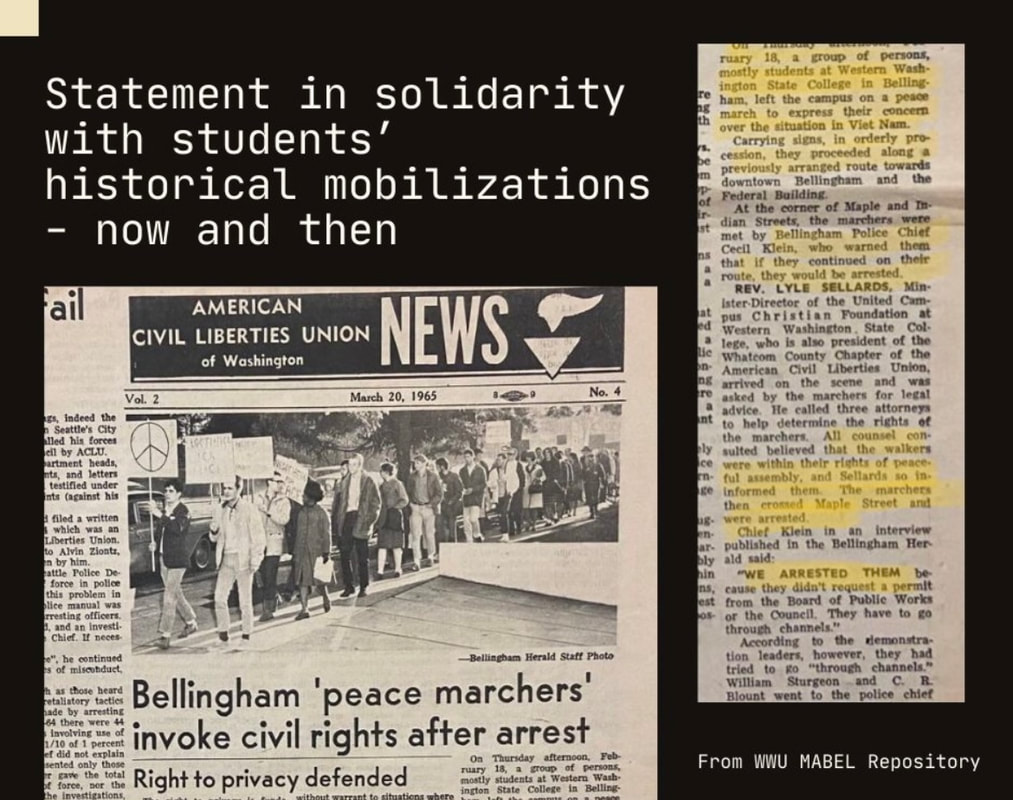
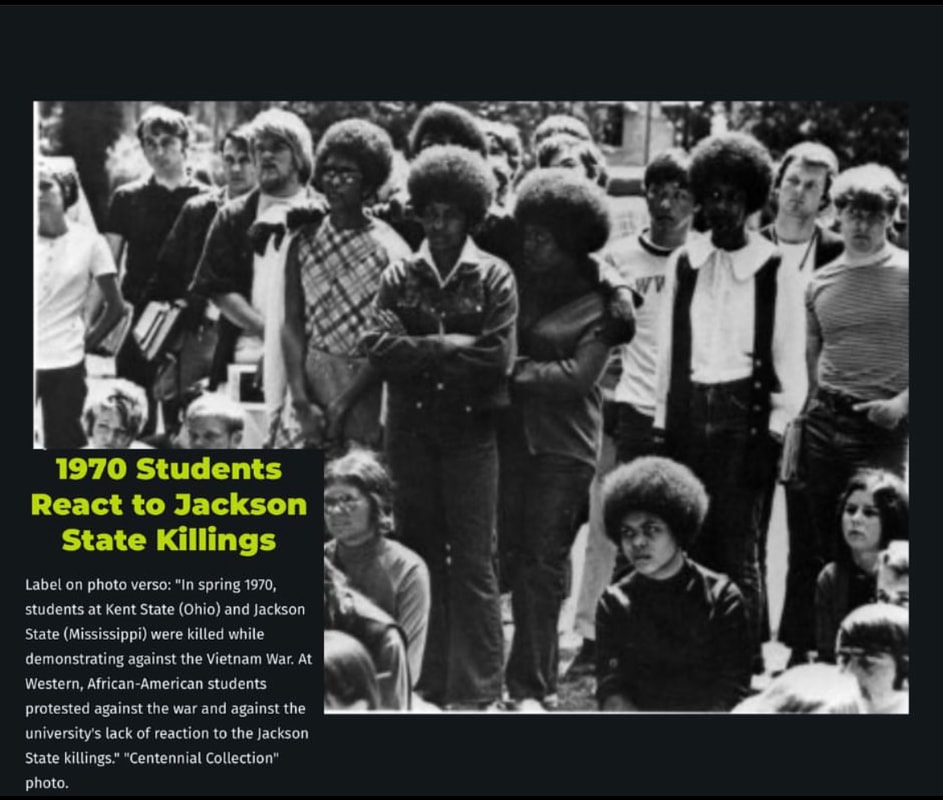
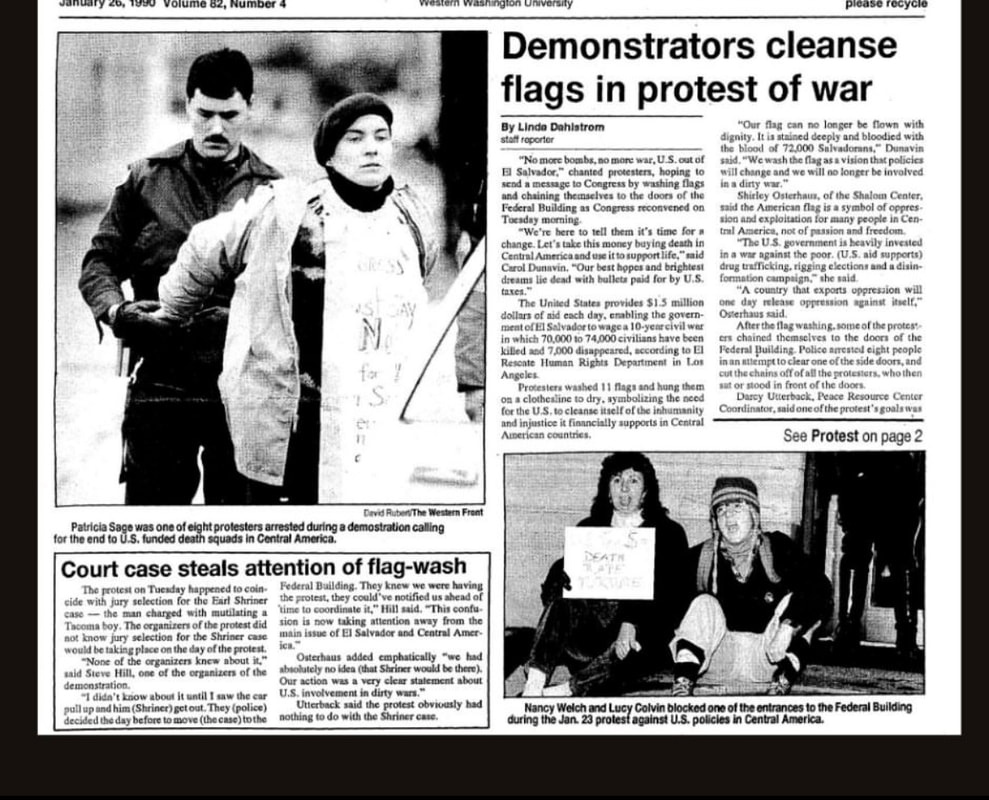
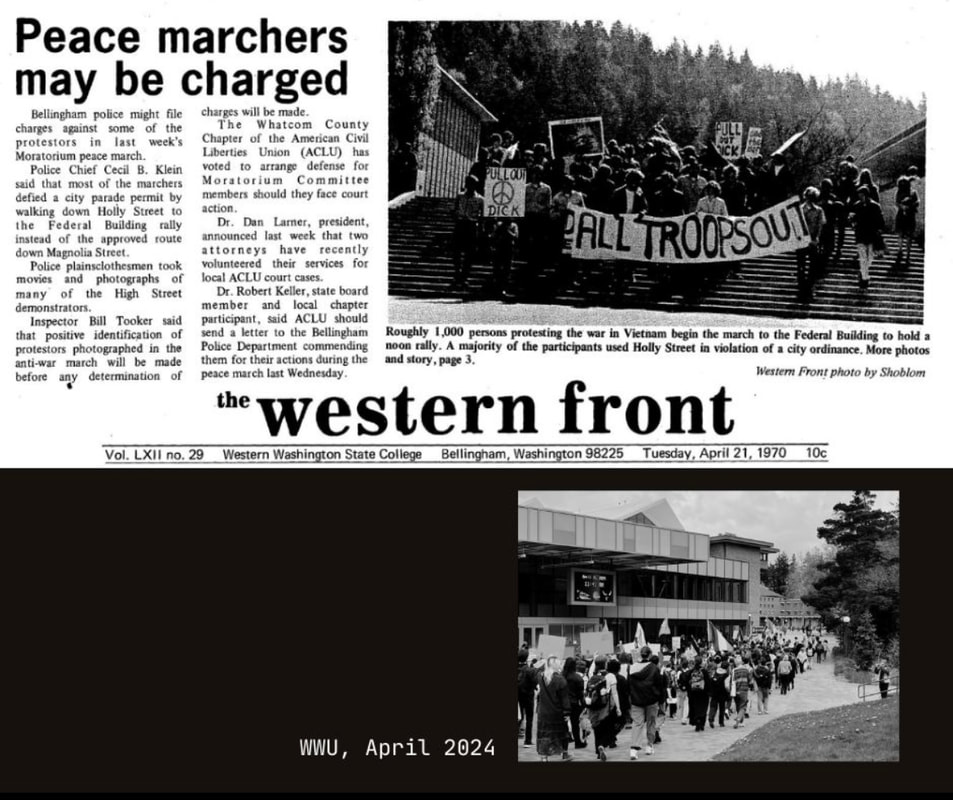
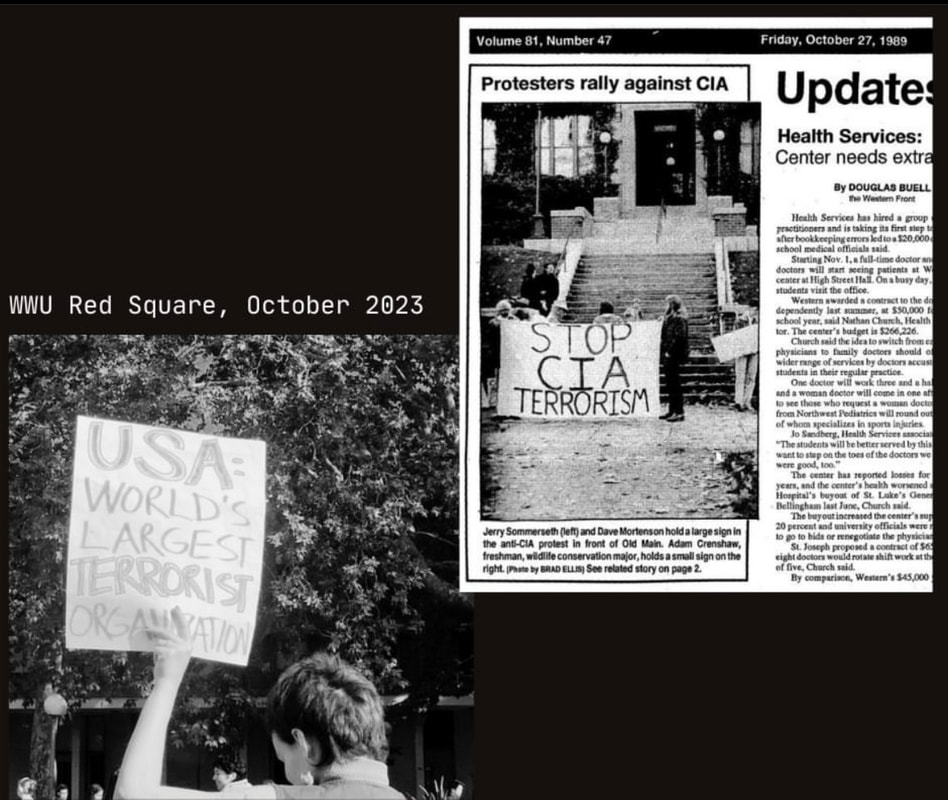
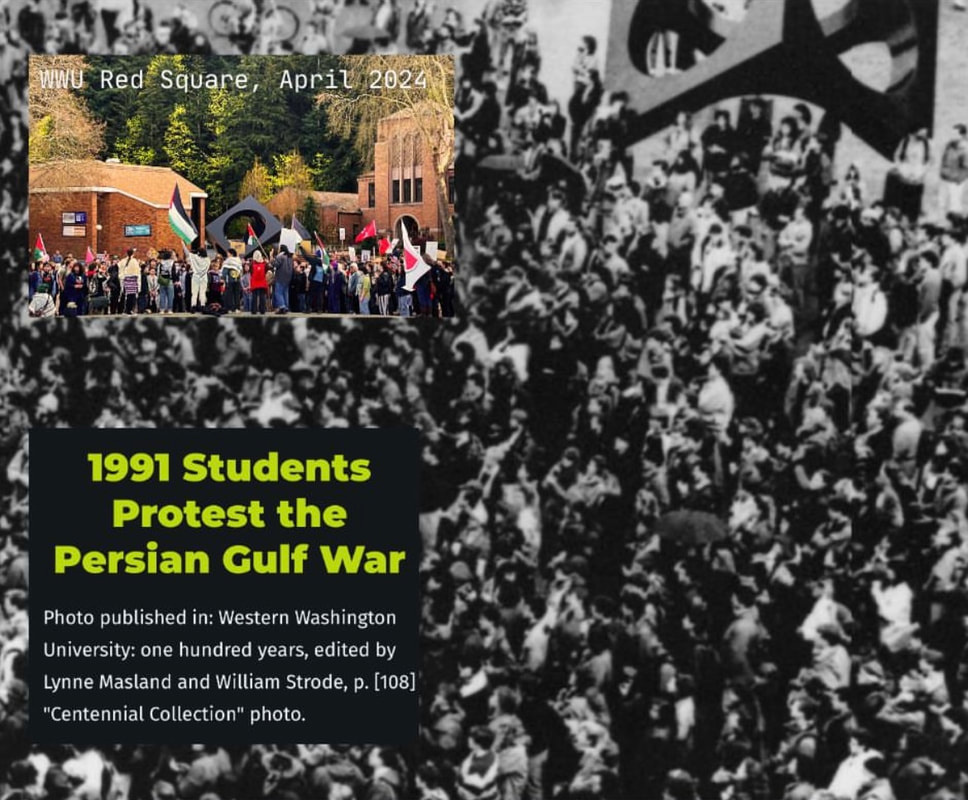

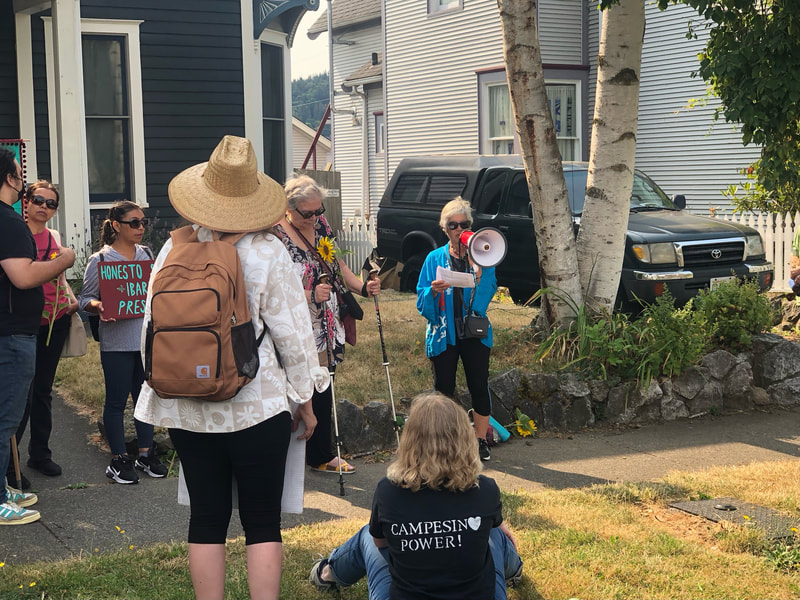
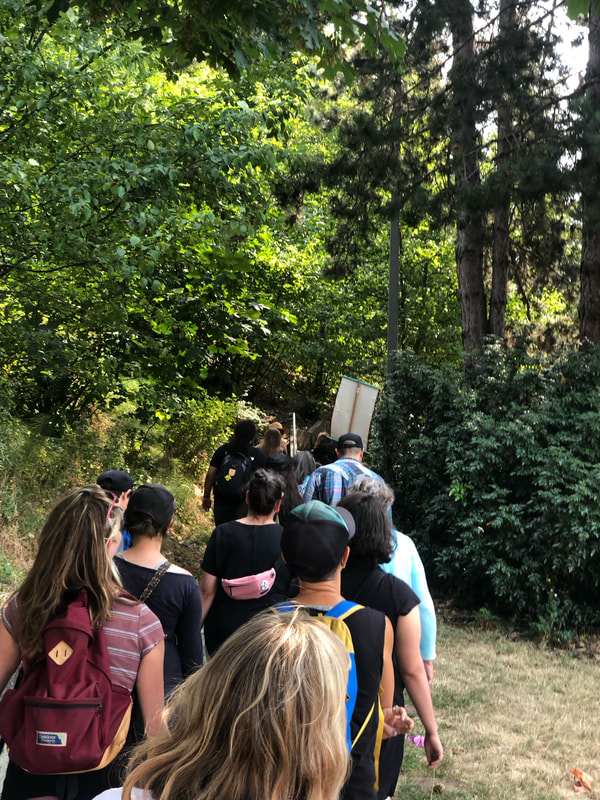
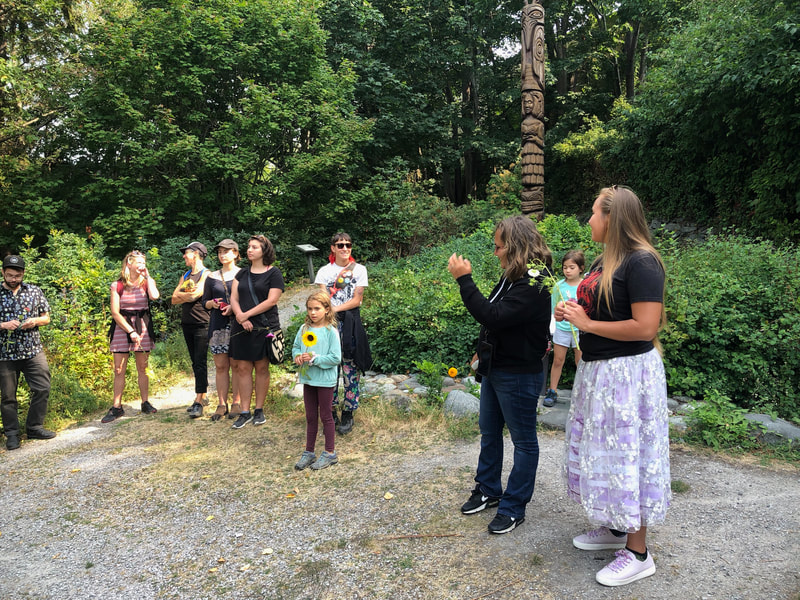
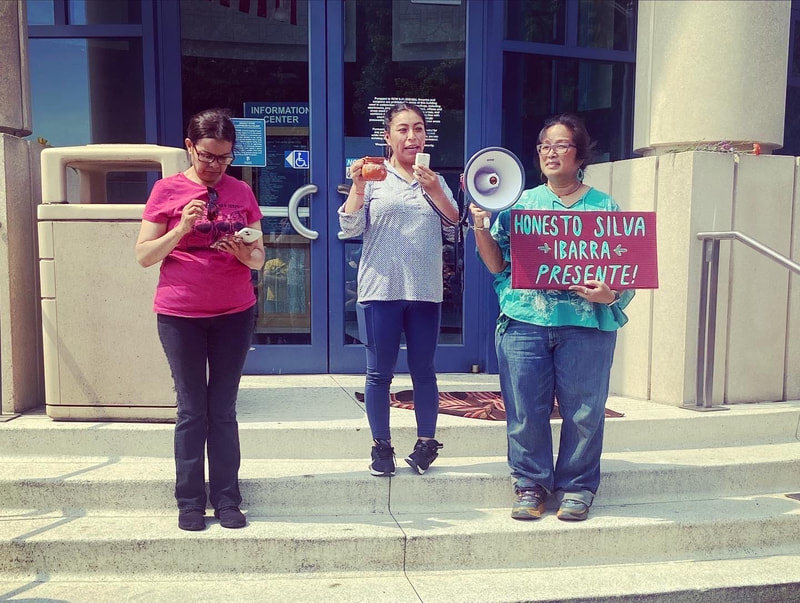
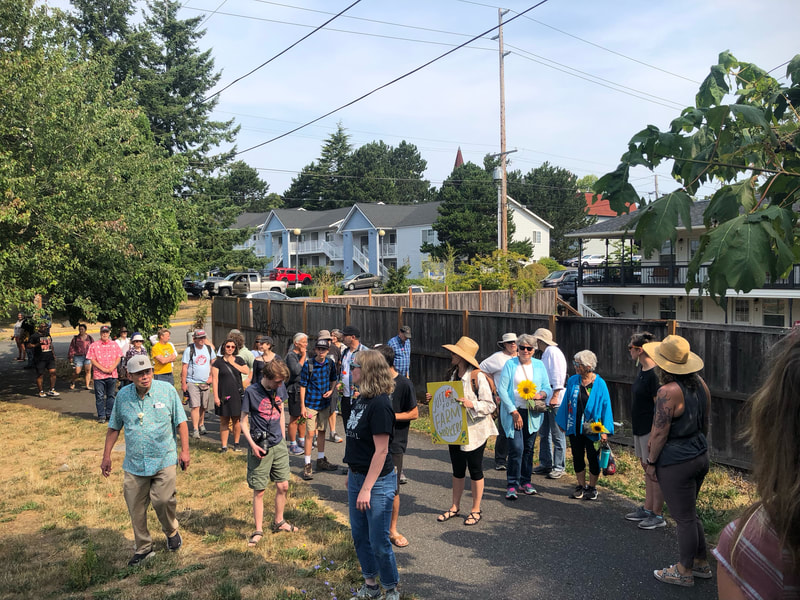
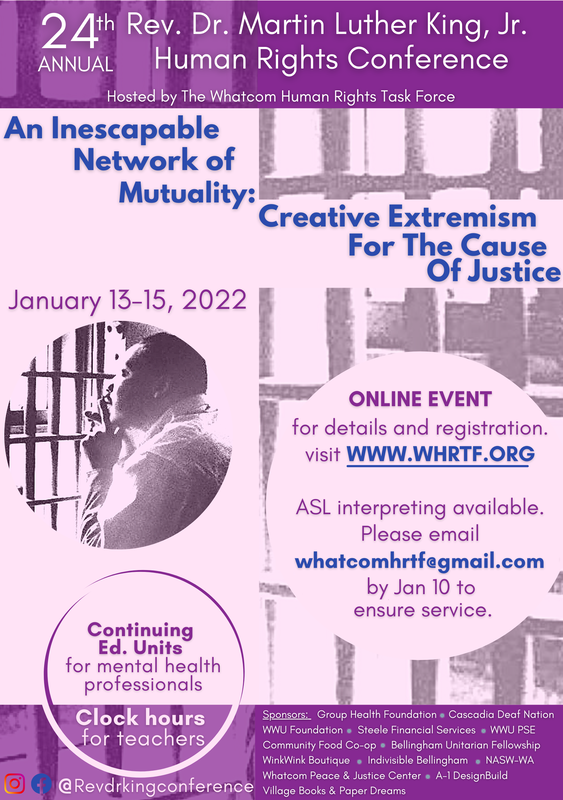
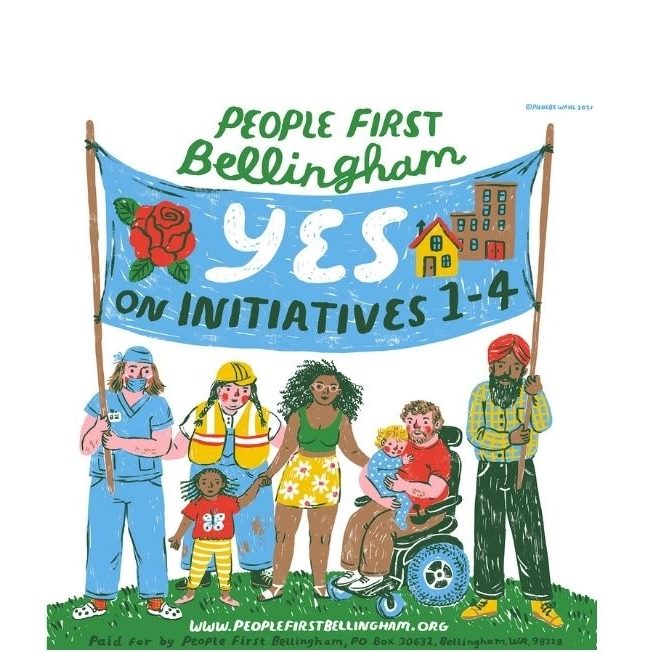
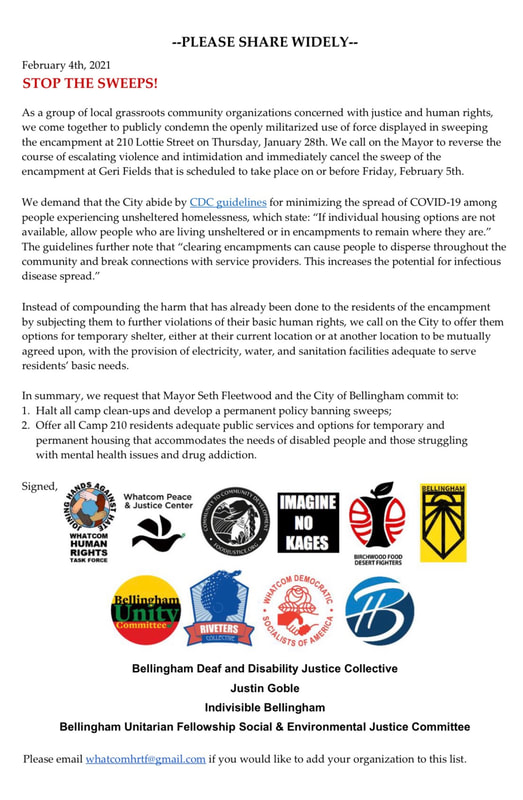

 RSS Feed
RSS Feed